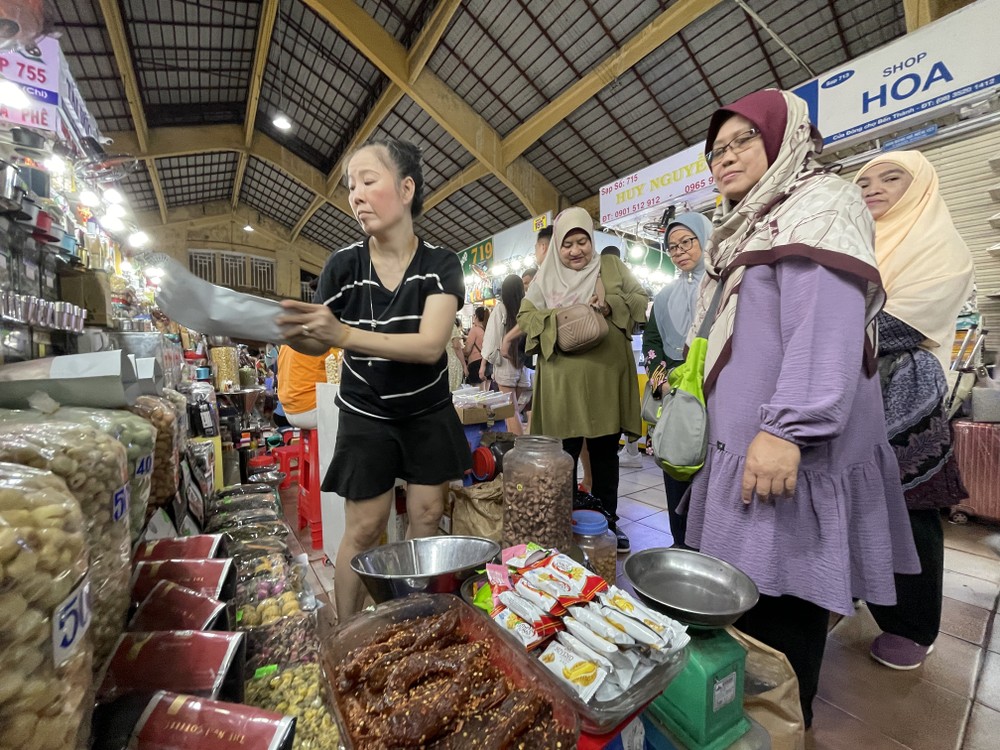
In response to the risk of Vietnamese export products facing high tariffs in major markets such as the U.S. and Europe, expanding deeper into the domestic market, along with diversifying foreign markets, is seen as both an immediate solution and a long-term strategy to ensure sustainable growth.
Businesses prioritize market presence of Vietnamese products
Businesses are prioritizing the establishment of a strong presence in the domestic market, which home to a population of over 100 million people.
Quoting data from the General Statistics Office under the Ministry of Finance, Chairman Nguyen Anh Duc of the Vietnam Retailers Association said that the total retail sales of goods and consumer service revenue in the first quarter of 2025 reached over VND1.7 trillion (US$653 million), up 9.9 percent over the same period. Of which, consumption of food and foodstuffs accounted for the highest proportion of 35.7 percent.
According to him, the figures demonstrate the immense potential of the domestic market. If businesses can effectively exploit the domestic market’s potential, it could fully offset the shortage of export orders.
In addition to shifting focus toward the domestic market, many economic experts emphasize that expanding trade promotion efforts into new markets can help mitigate risks for businesses—especially amid the growing trend of global trade protectionism.
According to Trade Representative of the Chilean Export Promotion Agency (ProChile) Pablo Arancibia Salazar, South America represents a vast market, with a total GDP of US$4 trillion and a population of 431 million. This region offers significant opportunities for Vietnamese products such as seafood, wood products, coffee, rice, and cement, which are highly favored by South American consumers. Vietnam is currently the 12th largest goods supplier in Chile with an export turnover of $1.4 billion.
Therefore, a strategic plan to deepen penetration into the Chilean market should be seriously considered. Another promising export opportunity lies within Muslim-majority countries, where product standards—particularly Halal certification—are strictly enforced. In 2024, Vietnam’s cashew industry exported 700,000 tons of cashew nuts valued at $3.8 billion, with the majority of orders requiring Halal certification along with other management and quality control standards.
Vice President Tran Van Hiep of the Vietnam Cashew Association noted that Vietnamese agricultural products with Halal certification hold a significant competitive advantage for expanding global market share. This market is exceptionally large and is projected to reach approximately $10 trillion by 2030, with an annual growth rate of around 5.5 percent.
Economists propose mechanisms to support businesses
To support businesses, experts recommend that authorities quickly implement financial policies to help companies invest in retail models. This should include maintaining 2 percent reduction in VAT on essential consumer goods.
In particular, the Ministry of Industry and Trade needs to develop or propose policies that are attractive enough to attract investment in regional distribution centers, which connect goods from cooperatives and small businesses to supermarket systems and convenience stores. This not only helps reduce intermediary levels, but also reduces transportation and storage costs and increases the ability to position Vietnamese brands in the market.
Chairman Nguyen Anh Duc highlighted a needs of stronger policies to accompany businesses through tax incentives, interest rate support and reduced operating costs. This is the basis for businesses to both maintain prices and invest in systems, while ensuring to attract domestic consumers as well as increase competitiveness in the international market.
Recently, many export enterprises have made efforts to find alternative markets, expanding their distribution networks to the Middle East, Africa, South Asia and Muslim countries in Southeast Asia. These markets not only have large populations but also have a rapidly increasing demand for Halal-certified food, beverages, textiles, and wood.
HALCERT Malaysia Director Ramlan Bin Osman stated that the Halal market presents a significant opportunity for Vietnamese businesses, provided they have a systematic strategy focused on quality, origin transparency, and support from the international certification and trade framework.
At a trade promotion conference with Vietnamese trade offices abroad earlier this month, Deputy Minister of Industry and Trade Nguyen Sinh Nhat Tan disclosed that the ministry is proactively building a support network to help Vietnamese enterprises diversify their markets. The focus is not just on traditional markets, but also on exploring new potential areas, particularly the lucrative Halal market. This is considered an essential strategy to reduce dependence on a few large markets, while flexibly responding to global trade fluctuations.
























